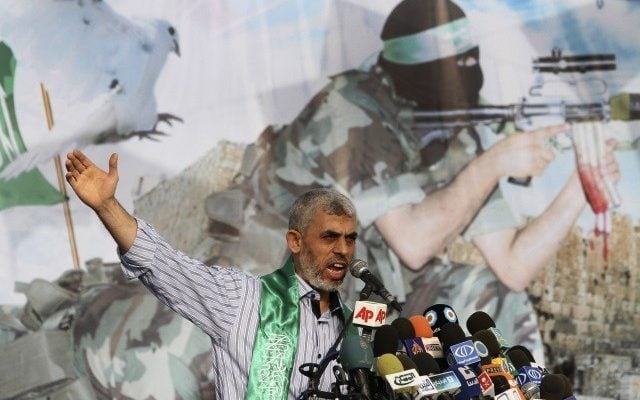Discord between Hamas’ political leader Ismail Haniyeh and military commander Yahya Sinwar has reached “unprecedented” levels Gaza sources say, adding that the two no longer speak.
By Daniel Siryoti, Israel Hayom via JNS.org
Hamas’ political leader Ismail Haniyeh and the group’s military leader Yahya Sinwar have been repeatedly locking horns over the terrorist group’s policies in the Gaza Strip, and the rivalry has gotten to the point where the two no longer speak to each other, Israel Hayom learned Wednesday.
According to Gaza sources, the growing animosity between the two has caused a rift in Hamas, pitting Haniyeh’s supporters against Sinwar’s supporters in a devastating split.
Haniyeh’s camp includes top political officials in the group and Sinwar’s camp hails from Hamas’ military wing, the Izzedine al-Qassam Brigades, led by Hamas strongman Mohammed Deif.
A senior Hamas official described the rift in Hamas’ leadership as ”unprecedented,” saying it has undermined the Egyptian-led efforts to strike an agreement between Hamas and Israel that would allow for the economic rehabilitation of Gaza.
”Sinwar, who was released [from Israeli prison] as part of the [2011] Schalit deal, is very committed to the issue of Palestinian prisoners,” the official added. “He promised the prisoners still in jail that he will do everything in his power to secure their release, and he is following through on that. Haniyeh is less interested in the prisoners and has refused various offers for a prisoner exchange deal with Israel.”
Sinwar, the official added, “is perceived as much more hawkish than Haniyeh, because he comes from the Izzedine al-Qassam Brigades, but the truth is he is far more pragmatic than Haniyeh, who can’t seem to make difficult decisions and take responsibility for them.”
A former senior Hamas official told Israel Hayom that the current crisis in the organization is so severe that many of its top members have decided to resign over it.
He said that former Hamas chief Khaled Mashaal has been asked to mediate between Haniyeh – his successor – and Sinwar, but has failed to bridge the gaps between the two.
“The result is that Hamas now has a two-headed leadership,” the former official said. “The political wing and the military wing each decide on their own policies without much coordination.”
Bad Blood
Giving an example of the bad blood between Haniyeh and Sinwar, another official recalled that “a few weeks ago, Haniyeh arrived at the [Israel-Gaza] border to support demonstrators there. His security guards whisked him away within minutes, fearing he would be hurt by the Israeli military’s tear gas and crowd control measures. A short while later, Haniyeh learned that Sinwar had arrived at the Khan Yunis protest and addressed the protesters. He was furious and told his associates, ‘Sinwar is doing everything he can to undermine my position, humiliate me and embarrass me.’”
The ongoing rivalry within Hamas even escalated recently, with cells loyal to the opposite camps clashing violently, firing warning shots at officials’ homes and planting explosives under their cars.
Top officials in Hamas’ political wing have even accused the military wing of establishing a “hit squad” tasked with intimidating Sinwar’s political rivals.
Several Hamas officials in both camps said that the Egyptian mediators have also realized that engaging with Sinwar was more effective than negotiating with Haniyeh.
”It’s not for nothing that all the recent talks involved Sinwar. The Egyptians don’t really see the point of talking with Haniyeh,” one official said.
Also on Wednesday, U.N. Middle East envoy Nickolay Mladenov downplayed reports suggesting Israel and Hamas have made progress on a potential prisoner swap.
Gaza’s rulers are holding the remains of two Israeli soldiers, Staff Sgt. Oron Shaul and Lt. Hadar Goldin, killed during Operation Protective Edge in the summer of 2014. Ethiopian Israeli Avera Mengistu and Bedouin Israeli Hisham al-Sayed, both mentally disabled, crossed into Gaza voluntarily in 2014 and 2015 and were captured by Hamas.
”We are very far from a deal that would secure the return of the Israeli soldiers’ bodies and the two living Israelis held by Hamas,” he said.
Mladenov also criticized the Palestinian Authority and said that “since the Egyptians began mediating between Israel and Hamas in 2017, “‘someone out there’ is trying to disrupt any progress.’””





